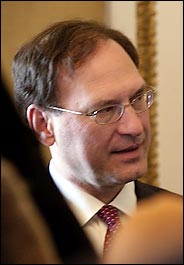
Listening to the Alito hearings over the last several days is frustrating and sometimes angering, to say the least. The typical partisan nature of the Judicial Committee members' comments, the grandstanding on both sides of the aisle, the failure to ask many of the crucial questions that demand answers -- all make for a stomach-churning, headache-inducing, generally disturbing experience.
This Supreme Court confirmation is perhaps the single most important decision facing this nation. It could well determine this country's policy direction in civil rights, privacy rights, presidential powers, women's rights, immigration rights, voters rights, prisoner of war rights, and just about any other issue one can imagine--for the next 40 years or so.
And yet, despite the importance of this decision, the Senate Judiciary Committee is largely behaving like two rival high school football teams, spewing snide remarks at one another, based on infantile, one-upsman, highly biased motives. In so doing, they have trivialized and cheapened the process and the importance of the proceedings.
While claiming that a judge must not be partisan, the senators' questions and comments, ironically, all have to do with their own partisan concerns and are little more than an attempt to decipher which way Alito's partisan views might color his judicial decisions--all the while, the republicans claiming that Alito is not partisan, the democrats insinuating that he is.
Alito, of course, states that, as a judge, he leaves all partisan or personal views out of his decisions. I believe he honestly believes he does. And that's the problem.
It's impossible for any human being on this earth to divorce their personal views from the decisions they make -- no matter what external decision-making framework one agrees to work within. A person can try, certainly. But he or she will, by nature of being an emotional, as well as a thinking human being, fail.
The panel of judges who today endorsed Judge Alito all lauded his intellectual integrity and honesty and attested that, in their intimate knowledge of this judge, they have never seen any indication that his decisions are predicated on any pre-conceived agenda or prejudice. I'm sure those statements, at least on the surface, are true.
But being a Supreme Court Judge involves interpreting the law. And how one interprets the law is based on one's personal beliefs and philosophical approach. Try as a judge might, he cannot change his personal, philosophical make-up by putting on a Judge's robe. His beliefs are his beliefs, an integral part of his makeup--who he is and how he thinks--operating both consciously and unconsciously to influence his decisions.
"Philosophy" is defined as "a theory or attitude held by a person or organization that acts as a guiding principle for behavior."
By its very nature, one's philosophy is born of one's personal beliefs, experience, and attitudes. So one's judicial philosophy of interpreting the laws is necessarily reflective of the same.
Why else would we have differing rulings from different judges hearing the same case? They approach the law from differing perspectives. That's human nature. It's no different than democrats and republicans approaching the solutions to the countries problems from different philosophical perspectives. It's unavoidable. It doesn't disappear. And it can't be controlled or extinguished at will, try as one might.
It is with this realization that one must view the approval or disapproval of Judge Alito.
The issue is not his intellectual or ethical abilities--everyone agrees he qualifies in those areas--the issue is the very one we are being told to ignore: his deeply held personal beliefs--because those beliefs will indeed, despite his attempts to the contrary, greatly influence his decisions on the Supreme Court.
In other words, all this talk in the hearings about Judges being non-partisan and non-political is baloney.
One of the judges on the panel today, a civil rights advocate and democrat, endorsed Alito based on his ethical, intellectual, and other laudible personal qualities. He admitted that while he did not always agree with Alito's decisions or his approach, a diversity of approaches was beneficial to the court -- in fascilitating the judges' consideration of different views and perspectives. I agree.
But what was not mentioned was how this would affect the present composition of Supreme Court. The majority of Supreme Court justices were appointed by Republican presidents and have a definite conservative bent. This bias is evident in many of the rulings of the court and is unavoidable, for the reasons given earlier, as long as human beings and not computerized robots sit on the court.
If we agree--and there is no argument about this--that the Supreme Court ideally should be an independent, non-political body, we would then logically conclude that--given the inability of any human being to divorce himself from his deeply held views--maintaining a balance of philosophical viewpoints, ie. from the left and from the right, is key to maintaining an ideal, politically neutral, politically independent court.
Since Justice Sandra Day O'Connor has consistently been the swing vote on many cases before the Supreme Court, and since, although a conservative appointee, she has ruled, on various cases, either to the left or the right of center, should Alito--who's judicial record reveals a somewhat extreme conservative leaning--replace O'Connor, the balance of the court would be significantly upset and the "benefit of different points of view" would more likely become secondary to the conscious or unconscious political bias of the majority.
I submit that no American--of any party or persuasion-- benefits from an unbalanced, biased Supreme Court. It is for that reason that I strongly oppose the confirmation of Justice Samuel Alito.
©The Unknown Candidate, 2006
Related Articles:

1 comment:
That is clever, well-reasoned, and clearly written. Which is why no one will ever pay attention.
Certainly not me, the Right Honorable Samuel A. Alito, Jr.
(the A stands for Awesome)
Post a Comment